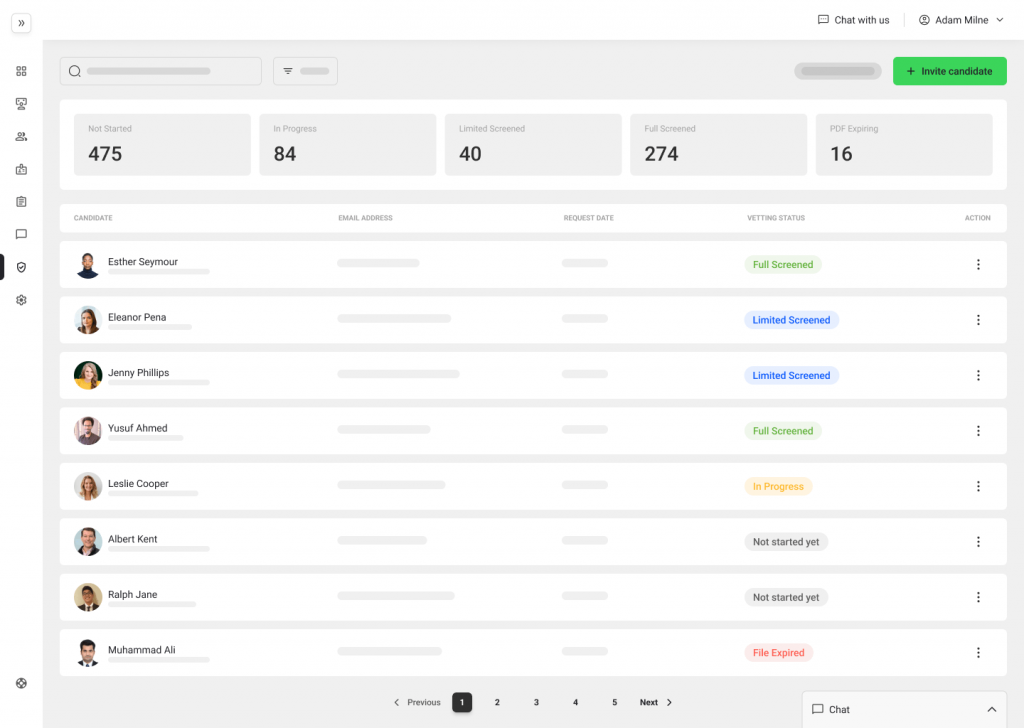Navigating the landscape of security vetting in the UK can be a complex challenge for any employer. With various standards and acronyms to decipher, ensuring you’re compliant while hiring the right people can feel like a daunting task. Two of the most important standards you’ll encounter are the Baseline Personnel Security Standard (BPSS) and BS7858. While both are designed to ensure the trustworthiness of individuals, they serve different purposes and are required in different contexts.
This guide will demystify BPSS and BS7858, clarifying what each standard entails, when you need to use them, and how you can avoid the inefficiencies of redundant data entry in your vetting procedures.
What is BPSS (Baseline Personnel Security Standard)?
The Baseline Personnel Security Standard, or BPSS, is the foundational level of security screening for anyone who has access to UK government assets. This includes civil servants, members of the armed forces, temporary staff, and contractors working on behalf of the government. It’s important to note that BPSS is not a formal security clearance but rather a pre-employment screening process that underpins higher levels of national security vetting.
The primary goal of BPSS is to confirm the identity of an individual and their right to work in the UK, while also providing a level of assurance as to their trustworthiness, integrity, and reliability.
BPSS screening involves four key checks:
•Identity Verification: Confirmation of the applicant’s identity through official documents
•Right to Work: Verification of the applicant’s legal right to work in the UK
•Employment History: A check of the applicant’s employment history for the past three years
•Criminal Record: A check for any unspent criminal convictions
What is BS7858?
BS7858 is the British Standard for the screening of individuals employed in a security environment. It is the established benchmark for the private security industry and is considered best practice for any organization that needs to ensure the integrity of its security personnel. For companies that are part of the Security Industry Authority (SIA) Approved Contractor Scheme (ACS), compliance with BS7858 is a regulatory requirement.
This standard is more rigorous than a basic background check and is designed for roles where the safety of people, goods, or property is paramount. It involves a more in-depth investigation into a candidate’s background to ensure they are of sound character and do not pose a risk to their employer or the public. Modern platforms like GuardCheck have streamlined this process, making BS7858 compliance faster and more efficient than traditional methods.
BS7858 vetting includes comprehensive checks:
•Identity Verification: Rigorous confirmation of the applicant’s identity
•Right to Work: Verification of the applicant’s legal right to work in the UK
•Financial History: A check of credit history and bankruptcy records for the past six years
•Employment History: Detailed verification of employment history for the past five to ten years
•Character References: In-depth character references are obtained and verified
•Address History: Verification of the applicant’s address history
•Criminal Record: A check for any unspent criminal convictions

BPSS vs. BS7858: The Key Differences
While both standards share the common goal of ensuring the reliability of personnel, they are designed for different sectors and have distinct requirements. Understanding these differences is crucial for compliance and cost-effective hiring.
Comparison Overview:
BPSS (Government Sector)
- Application: Government departments and contractors
- Employment History: 3 years required
- Financial Checks: Not included
- Character References: Not required
- Target Roles: Civil servants, military personnel, government contractors
BS7858 (Private Security)
- Application: Private security industry
- Employment History: 5-10 years required
- Financial Checks: 6-year financial probity check
- Character References: Required and verified
- Target Roles: SIA-licensed personnel, security staff, high-trust positions
These differences have significant implications for employers. Choosing the wrong standard can lead to non-compliance, or conversely, unnecessary and costly over-vetting of candidates. For comprehensive guidance on implementing effective screening processes, our blog on best practices for security vetting provides essential insights for 2024.
When Do You Need BPSS vs. BS7858?
Knowing when to apply each standard is essential for compliance and efficiency:
Use BPSS when you are hiring for roles that involve access to government assets, information, or premises. This applies to all civil servants, military personnel, and any contractor or temporary staff working for a government department.
Use BS7858 when you are a security company hiring SIA-licensed personnel, or you are hiring for any role in the private sector that involves a high level of trust and responsibility for the safety of people, property, or sensitive information. For a detailed breakdown of the process, see our comprehensive guide to BS7858 screening steps.
The Problem of Double Work in Security Vetting
One of the biggest frustrations for employers is the duplication of effort in the vetting process. Often, a candidate may have undergone one type of check, but then needs another for a different role, leading to a time-consuming process of re-entering the same data into multiple systems. This manual re-entry not only wastes valuable time but also significantly increases the risk of human error, which can lead to compliance issues and flawed hiring decisions.
The Solution: Single Data Capture for Streamlined Vetting
The answer to this inefficiency lies in adopting a single data capture approach. By using an integrated digital platform, you can create a single point of entry for all candidate data. Once the information is entered, it can be seamlessly used for either a BPSS or a BS7858 check, without the need for manual re-entry. This follows the principle of “One Entry, Multiple Outputs” [3].
How Single Data Capture Works
Modern security vetting platforms eliminate double data entry through:
Centralized Data Entry: Candidates enter information once into a secure portal, creating a digital profile for multiple vetting requirements.
Automated Verification: The platform uses this data to run required checks for BPSS, BS7858, or both.
Integrated Systems: Platforms integrate with existing HR systems, eliminating manual data transfer.
This approach saves time, reduces errors, improves candidate experience, and ensures compliance with clear audit trails. Traditional vetting processes can take up to 12 weeks, but with modern platforms, you can achieve security staff vetting in just 6 days.
Making the Right Choice for Your Business
Choosing between BPSS and BS7858 doesn’t have to be complicated. By understanding the specific requirements of the roles you are hiring for, you can easily determine which standard is appropriate. Modern, integrated vetting platforms eliminate the inefficiencies of traditional, paper-based processes while ensuring full compliance with regulatory requirements.
At GuardPass, we understand the importance of fast, reliable, and compliant security vetting. Our BS7858 and BPSS screening platform is designed to streamline the entire vetting process, providing you with comprehensive reports in as little as 48 hours. By embracing technology and a single data capture approach, you can ensure you are hiring the right people, every time, without the headache of double work.
Ready to transform your security vetting process? Discover how GuardCheck makes BS7858 vetting fast and compliant, and start hiring with confidence today.
